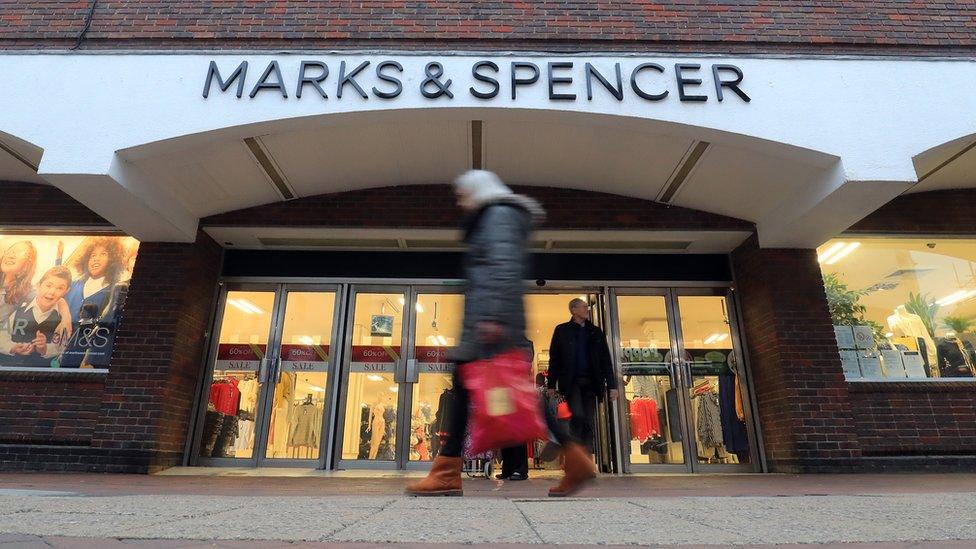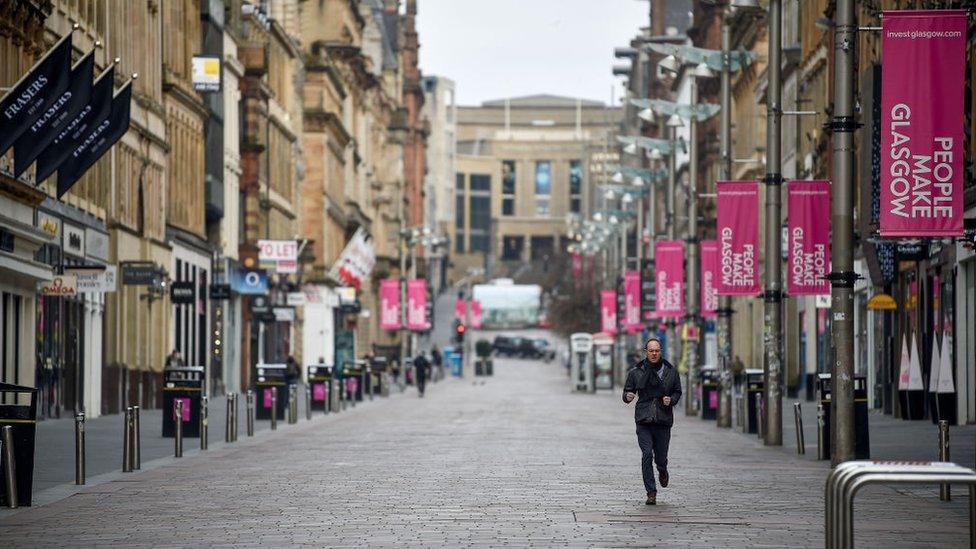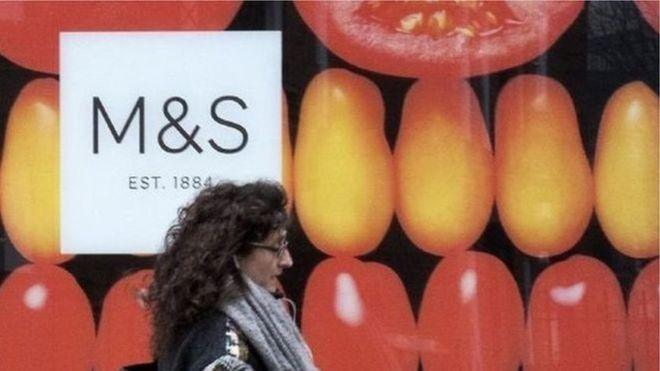Coronavirus: Not just any retail recession...
- Published

Where there's a crisis, there's an opportunity to drive reform: M&S is used to being in crisis, and the new mantra is "never the same again". It's a road others can be expected to take.
There are high costs to managing garment stocks, but don't be surprised to see this year's spring ranges return next year.
The retailers' boss is making permanent moves to more flexible staffing, accelerating store closures and pushing for lower rent, while lockdown has shown him he can delegate while stripping out head office jobs.
Never miss the opportunity of a big crisis, goes the advice. Marks & Spencer starts with a big advantage - it's already very used to being in crisis.
With its annual results, its boss has seized on the opportunity to push further and faster than he was already doing.
It's a ploy you can expect other business leaders to adopt, so it may be of interest to see how Steve Rowe is going about it.
The striking thing about this one-time flagship of British retail is that it has survived being in crisis for so long. That's partly because the M&S food business has done at least OK in navigating changes to the grocery market.
It has invested, for instance, in smaller outlets at locations with a big "food-to-go" footfall - notably at railway stations. That's causing it some pain at the moment, with so few rail travellers.
Food has helped support it through a perpetual state of crisis with its clothing and home ranges. Criticised for being too frumpy, it has chopped and changed its design teams, its store design, its buying strategy, its marketing... and even when it got things right, it didn't order enough stock.
Chief executive Steve Rowe says the turnaround strategy was on track. A 2% drop in revenue in the year to March isn't bad by M&S standards, even though pre-tax profits are down 21%.
Never the same again
But clearly, the garment trade is now in a horrible mess, holding stock for summer that it can't sell, with an appetite for online sales sharply down, and no clarity about when it can get back to normal business.
The Scottish Retail Consortium figures for April are out, and they make predictably dire reading. Inflation is down to only 0.8%, and at risk of heading into deflation, which would be a bigger nightmare for retailers. If consumers have an expectation that prices will keep falling, then they hold off purchases.
Mr Rowe's message to investors and staff is to take "£1bn of actions" for the short term, including £100m less late summer stock on order, £50m down on marketing, £40m saved by freezing recruitment and pay, £40m less on technology, £60m through ordering less stock £50m saved by furloughing staff, and £140m less capital spend.
Some £400m of stock is not seasonal, so it stays on the shelves. £200m of spring stock will be put in warehouses for next year. Extra costs for changes in stocking: £145m.

Note that a lot of that is bad news for the supply chain, in this country and for overseas garment workers. It's better news if you're renting warehouse space.
Beyond the short term, M&S has a new mantra: "never the same again". Steve Rowe says it is learning lessons: of a smaller, nimbler top team, delegated decisions, with working groups and committees disbanded.
Staff have improvised and learned to multi-task, in-store and in support roles. Microsoft Teams software is a key relationship. Buying policy is focussed on stocking "more of less from fewer core suppliers".
It seems all that is going to remain in place. That saves cost, and costs mean jobs: "central support costs and headcount will be examined at all levels".
Lending conditions
Transformation plans get accelerated, and that means changes to supply chains: decisions are made closer to the supplier, which is often overseas, while more will be 'near-sourced' for online seasonal products that need quick turnaround.
M&S wants to vacate older, underperforming store locations, and is joining other retailers in a hard-bargaining drive to lower rent levels.
Commercial landlords won't be at all surprised. Intu, a shopping mall giant which owns Braehead shopping centre in south-west Glasgow, told its creditors this week to brace for their lending conditions to be broken, as rents simply aren't paid. The implicit message: if you collapse this business, good luck finding another one that can work the asset any better!
Says Steve Rowe at M&S: "Whilst some customer habits will return to normal others have changed forever, the trend towards digital has been accelerated and changes to the shape of the high street brought forward.
"Most importantly, working habits have been transformed and we have discovered we can work in a faster, leaner, more effective way. I am determined to act now to capture this and deliver a renewed, more agile business in a world that will never be the same again."
Going concern, or gone?
Talking of business strategy, one of the most awkward decisions facing company directors and auditors in the next few months is going to be signing off on accounts. The "going concern" statement is meant to reassure creditors and investors that the business will still be around in 12 months.
Without a "going concern" signature, the red light starts flashing at your bank branch, so it's definitely preferable to have one.
In current circumstances, and for many companies, getting from here to this time next year is not at all certain.
So the Institute of Chartered Accountants in Scotland is today offering updated guidelines. You might hope it would offer some reassurance.
Instead, its chief executive, Bruce Cartwright, says directors should "consider the specific facts and circumstances of their company in determining the extent of the procedures to be undertaken when forming the going concern assessment, whilst being cognisant of wider macroeconomic conditions".
Reassured by that? No, me neither. What does it mean? Well, with no specialist qualification in such matters, my interpretation is "Ca' canny, don't just hope for the best, and this is no time to bend the rules".
Mr Cartwright, a veteran insolvency practitioner, emphasises the need for such statements to be clear and transparent about the evidence available, as well as uncertainty. He adds that companies need to think about permanent changes in the markets where they operate, whether their business model remains sustainable, and whether they need to diversify.

RISK AT WORK: How exposed is your job?
SCHOOLS: When will children be returning?
THE R NUMBER: What it means and why it matters
A SIMPLE GUIDE: What are the symptoms?

- Published20 May 2020

